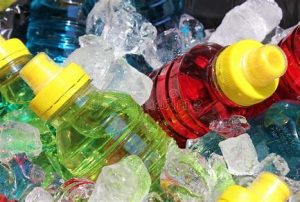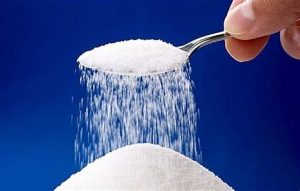 We all need to replenish our bodies with the water we lose every day through normal activity. However, a sports drink might be a better choice during and after intense exercise to replenish minerals lost through sweat.
We all need to replenish our bodies with the water we lose every day through normal activity. However, a sports drink might be a better choice during and after intense exercise to replenish minerals lost through sweat.
Sports drinks are basically fortified and flavored water meaning that electrolytes and carbohydrates have been added to provide sodium, potassium, calcium and magnesium (to name a few).
Some contain vitamins and minerals like the B-Complex vitamins (I always like to know their source…are they synthetic or natural?)
 They also include sugar. This is added to provide immediate energy. The kind of sugar added varies with the manufacturer. It should come from glucose, sucrose, and/or fructose — all of which are easily and quickly absorbed. It shouldn’t be carbonated, as the bubbles can lead to an upset stomach. Ask yourself if the sugar a natural source or an artificial sweetener. These sweeteners can pose health risks which I will address in an upcoming article.
They also include sugar. This is added to provide immediate energy. The kind of sugar added varies with the manufacturer. It should come from glucose, sucrose, and/or fructose — all of which are easily and quickly absorbed. It shouldn’t be carbonated, as the bubbles can lead to an upset stomach. Ask yourself if the sugar a natural source or an artificial sweetener. These sweeteners can pose health risks which I will address in an upcoming article.
![]() Warning: Sugary drinks are cited as a leading source of sugar, which contributes heavily to the high obesity rate in the US, so keep this in mind when you are preparing for your workouts. You don’t want to overdo it on the sugar…that would be counterproductive.
Warning: Sugary drinks are cited as a leading source of sugar, which contributes heavily to the high obesity rate in the US, so keep this in mind when you are preparing for your workouts. You don’t want to overdo it on the sugar…that would be counterproductive.
 Sports drinks might also include amino acids to help with muscle recovery (again…what’s the source?) These are the building blocks of protein. Complete proteins have 8 essential amino acids so the question is: “What have they added to that drink”? Throwing in a few to make it look good will not add much to your health.
Sports drinks might also include amino acids to help with muscle recovery (again…what’s the source?) These are the building blocks of protein. Complete proteins have 8 essential amino acids so the question is: “What have they added to that drink”? Throwing in a few to make it look good will not add much to your health.
Another possible ingredient might be caffeine to enhance performance during workouts. It’s recommended that caffeine intake not exceed 400mg daily. I wrote about this in another article about Tea which is in this blog and also in the June Archives. Read the ingredients for the amount added and count it toward your total daily intake of it.
 In choosing a sports drink there are 2 important points to consider:
In choosing a sports drink there are 2 important points to consider:
- The ingredients in a specific drink in order to weigh the pros and cons and make an informed decision;
- Your specific dietary needs, like the type of exercise taking place. How intense will it be?
 Does that drink contain dyes and food additives? Powerade Fruit Punch, for example, contains “glycerol ester of rosin.” Apparently that is a derivative of wood resin used to adjust the weight of beverages. Do you want to ingest wood resin?
Does that drink contain dyes and food additives? Powerade Fruit Punch, for example, contains “glycerol ester of rosin.” Apparently that is a derivative of wood resin used to adjust the weight of beverages. Do you want to ingest wood resin?
You might want a sports drink if:
*If you are exercising in hot weather and are sweating profusely. Do you notice salt on your skin?
*You just finished an endurance event like a marathon.
*You need quick fuel during long workouts.
*You need simple carbs to avoid feeling dizzy or wobbly.
Bottom Line: Sports drinks do count toward your daily intake of fluids. Some contain more water than others, which is a good thing. I suggest you read my source by CNET for additional information and then choose drinks that fit your values and your particular needs. I believe in being flexible, and using common sense in meeting my nutritional needs on a daily basis. If I am playing in a tennis tournament during the hot summer afternoon in the Tucson desert I’m going to plan ahead very carefully to meet that challenge. It might require more carbs, sugar, caffeine, etc. Tennis is a very demanding sport and fitness is everything. Think about the nutritional requirements for your sport or workout regimen and determine your special needs for success.
https://www.cnet.com/health/water-vs-sports-drink-which-is-better-for-workout-hydration/
https://www.webmd.com/fitness-exercise/features/drink-up-sports-fitness#2
![]()
